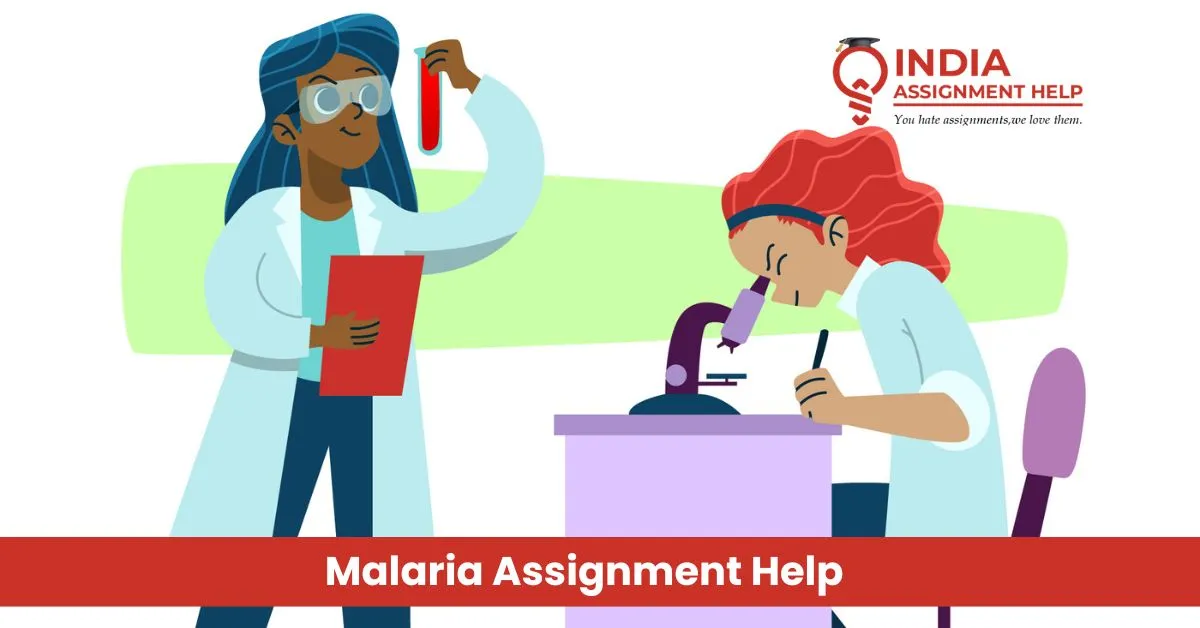Malaria Assignment Help: Core Academic Support

Malaria is among the most significant public health concerns in diverse parts of the tropical and subtropical world. The morbidity and mortality rates of this disease make it a significant challenge for healthcare systems. Thus, knowledge of malaria is pivotal for any student pursuing education in infectious diseases and public health. This Malaria assignment help focuses on some of the main features of malaria and how assignments help students achieve their objectives.
What is Malaria?
Malaria is one of the diseases caused by Plasmodium parasites, which are transmitted to humans through the bites of infected mosquitoes from the Anopheles species. With malaria assignment help, deep knowledge about the aetiology and lifecycle of the disease enables the student to understand the spread and human health impact clearly.
Transmission and Risk Factors
Malaria is transmitted mainly in warm-temperature regions where mosquitoes are found in large quantities. Infections and poor health systems have been regarded as risk factors. Malaria homework helps the student discuss the necessary aspects behind malaria-related prevalence.
Symptoms and Diagnosis
Common presentations of malaria include the following: fever, chills, headaches, body aches, and general fatigue. The worst complications involve anaemia, organ failure, and even death. Blood tests normally help in diagnosing malaria through the detection of Plasmodium parasites. Malaria assignment tutors educate learners about methods of diagnosis and difficulties posed during early detection.
Treatment and Drug Resistance
Malaria treatment is primarily focused on antimalarial medications. The first-line drugs are chloroquine and artemisinin-based combination therapies, known as ACTs. Many challenges have been noted due to drug resistance, particularly in older drugs. The work the malaria assignment service has conducted may be instrumental in the treatment method and new drug design targeting resistant strains.
Prevention and Control Measures
Preventive measures include insecticide-treated mosquito nets, indoor residual spraying, and antimalarial prophylaxis. Public health campaigns also play an important role in teaching the populace malaria prevention. Malaria assignment writer support will guide students on productive prevention strategies to be explored and looked into. Effects of Global Efforts against Malaria
Global Efforts to Combat Malaria
Malaria cases and death levels have been reduced, according to the campaigns undertaken by the World Health Organization (WHO) and many other non-profits. Reducing malaria morbidity and mortality is helped through funding research, increasing treatment access, and distributing prevention tools. The Do My Malaria assignment services help students understand these initiatives and their outcomes.
The Role of Education in Malaria Prevention
Education empowers communities to adopt preventive measures. General health education campaigns enhance the message's publicity and adoption of protective measures. Malaria assignment helps emphasise the community in fighting malaria and education methods that effectively work.
Challenges in Eradication
Despite this much progress, malaria eradication still presents several challenges. The body suffers drug resistance, sometimes funding is limited, and infrastructure for these remote areas is lacking. Pay for Malaria assignment resources can help students examine the challenges and the potential answers to this hard work.
Recent Advances in Malaria Research
Studies have recently discovered several new vaccines with much greater efficiency and efficacy. These include the RTS S/AS01 malaria vaccine, which has been proven to greatly affect the inhibition of infection. Another innovation of genetic engineering is currently being used to control the mosquito population and prevent the spread of Plasmodium parasites. Discussing malaria with students through a Malaria assignment expert leads to discussing future scientific developments.
Impact of Climate Change on Malaria Distribution
Climate change has a far-reaching impact on malaria distribution, as the changes in the temperature and rainfall regimes can affect the survival of mosquitoes. Therefore, areas previously out of the geographical reach of warmer climates would expand the distribution of malaria and leave public health systems in a new challenge. A malaria assignment service on malaria helps students understand the intimate relationship between environmental changes and the spread of disease.
Conclusion
In studying malaria, it becomes clear that this complicated topic has scientific, social, and economic dimensions. Our experts will help students complete their assignments while providing an all-around analysis of this complicated topic. Personalised guidance and resource links are available at India Assignment Help.
FAQs
Q1. What is the common symptom of malaria?
Ans. Common symptoms of malaria include fever, chills, headache, muscular pain, and fatigue.
Q2. What is the diagnosis of malaria?
Ans. The diagnosis is confirmed by blood tests detecting the presence of Plasmodium parasites.
Q3. What are some preventive measures to combat malaria?
Ans. Preventive measures include insecticide-treated nets, indoor residual spraying, and prophylactic drugs.
Q4. What is the obstacle to overcoming malaria?
Ans. Some obstacles include drug resistance, lack of funding, and undeveloped healthcare infrastructure.
Q5. Why Would I Need Assignment Help For The Study Of Malaria?
Ans. Expert help always offers extensive research, insights, and support to help students shine in their academic work.





